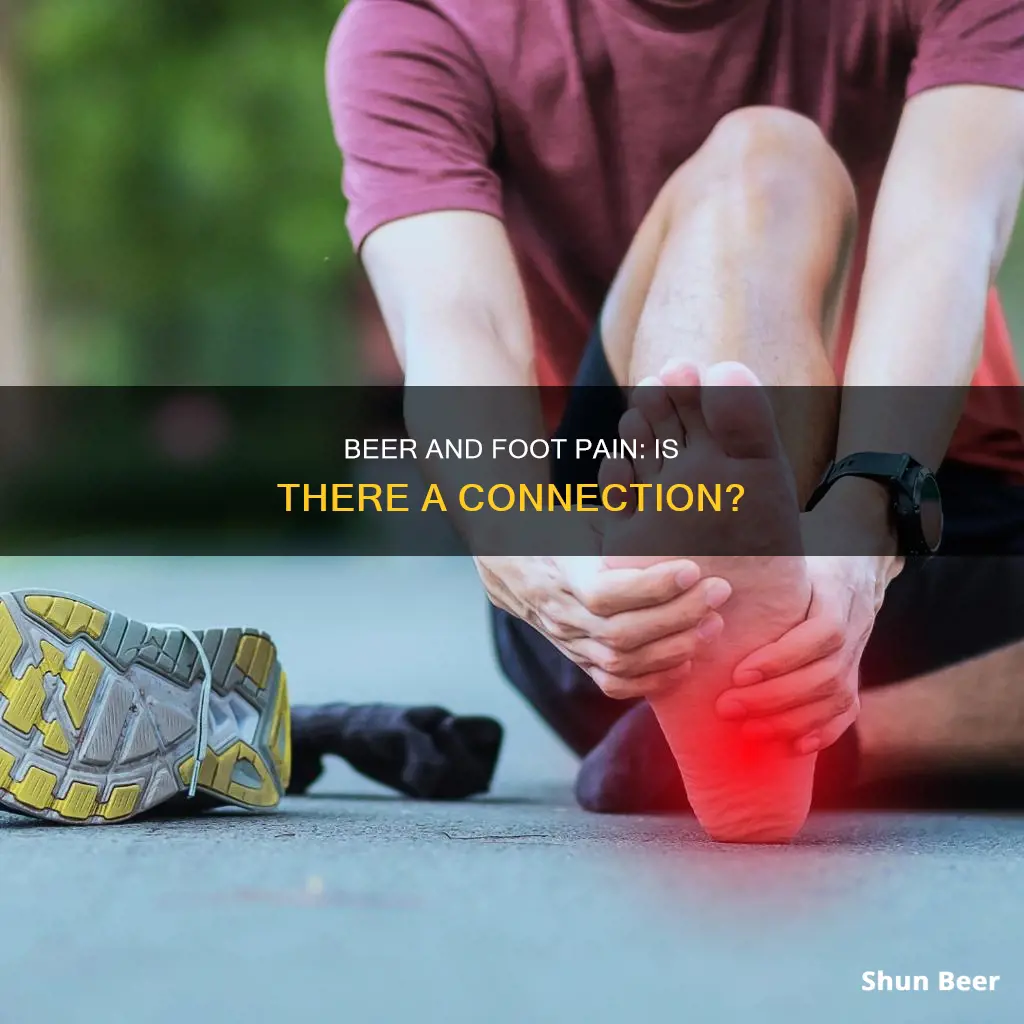
Drinking beer has been linked to foot pain, with several factors contributing to this effect. Firstly, alcohol abuse over a prolonged period can lead to alcoholic neuropathy, a form of nerve damage that results in numbness, tingling, pain, and weakness in the feet. This condition can become permanent if left untreated, affecting both nerves and the brain. Additionally, alcohol consumption can cause dehydration, leading to dry and cracked feet. Alcohol also impedes the delivery of essential nutrients and oxygen to the feet, affecting their overall health. Furthermore, drinking can cause foot and leg swelling, known as edema, due to its impact on kidney function and electrolyte balance. Excessive drinking is associated with an increased risk of developing gout, a type of arthritis that causes extreme pain, swelling, and redness, typically in the big toe. Lastly, heavy drinking during early adulthood increases the chances of developing osteoporosis later in life, which can compromise foot health due to the high proportion of bones in the feet.
| Characteristics | Values |
|---|---|
| Frequency | Drinking beer occasionally is not considered toxic to the body. However, long-term alcohol abuse can have serious consequences. |
| Swelling | Alcohol can cause the body to retain more water, leading to swollen feet. |
| Numbness | Alcoholic neuropathy can cause numbness in the feet. |
| Pain | Alcoholic neuropathy can cause pain in the feet. |
| Weakness | Alcoholic neuropathy can cause weakness in the feet. |
| Tingling | Alcoholic neuropathy can cause a tingling sensation in the feet. |
| Heavy feeling | Alcohol can cause a heavy feeling in the limbs. |
| Muscle weakness | Alcohol can lead to muscle weakness. |
| Dehydration | Alcohol can cause dehydration, which can result in dry and cracked feet. |
| Gout | Alcohol consumption is a contributing factor to gout, a type of arthritis that affects the big toe and causes pain, swelling, and redness. |
| Osteoporosis | Excessive drinking in your 20s increases the risk of developing osteoporosis later in life, which affects foot and toe health. |
| Psoriasis | Alcohol consumption can cause psoriasis, a skin condition that leads to dryness, cracked skin, and pits on the toenails. |
What You'll Learn

Alcoholic neuropathy
Alcoholism, now called alcohol use disorder (AUD), is a condition in which a person has difficulty stopping or managing their alcohol intake despite experiencing negative consequences. According to the National Institutes of Health, nearly 29 million people had AUD in the United States in 2021.
Chronic alcohol consumption can have harmful effects on the central and peripheral nervous systems. Alcoholic neuropathy is one of the most common adverse effects of chronic alcohol consumption. There is damage to the nerves due to the direct toxic effect of alcohol and the malnutrition induced by it. Patients may experience pain, ataxia, and paresthesias in the lower extremities.
The exact cause of alcoholic neuropathy is unknown, but it likely includes both a direct poisoning of the nerves by alcohol and the effect of poor nutrition associated with alcoholism. Up to half of long-term heavy alcohol users develop this condition.
In addition to foot pain, symptoms of alcoholic neuropathy can include:
- Numbness in the arms and legs
- Abnormal sensations, such as "pins and needles"
- Muscle problems, including weakness, cramps, aches, or spasms
- Heat intolerance, especially after exercise
- Erection problems (impotence)
- Problems urinating, incontinence, feeling of incomplete bladder emptying, difficulty beginning to urinate
- Constipation or diarrhea
- Problems swallowing or talking
- Unsteady gait (walking)
The first step to preventing or treating alcoholic neuropathy is to stop consuming alcohol. Abstaining from alcohol can help restore nutritional health, improve symptoms, and prevent further nerve damage. However, some alcohol-induced nerve damage is permanent.
Knobel's Beer Rules: What You Need to Know
You may want to see also

Dehydration
Firstly, alcohol causes dehydration, and this can lead to dry, cracked feet. This is because when the body is dehydrated, the skin loses moisture, and the feet are particularly susceptible to this.
Secondly, dehydration can cause swelling in the feet. Alcohol affects the kidneys' ability to filter and process electrolytes, leading to a build-up of water in the body, resulting in swollen feet and hands. This swelling is known as edema and is a common side effect of alcohol consumption.
Additionally, alcohol impedes the delivery of essential nutrients and oxygen to the feet. This is due to the dehydrating effects of alcohol, which can slow down the rate at which blood delivers nutrients to the feet.
Finally, dehydration caused by alcohol consumption can increase the risk of developing gout, a type of arthritis that typically affects the big toe. Gout is caused by elevated levels of uric acid in the blood, which forms sharp crystals that are deposited in the joints, causing extreme pain, redness, and swelling.
To mitigate the dehydrating effects of alcohol, it is important to drink water alongside alcoholic beverages and to stay hydrated before and after drinking.
Beer and Mounjaro: Safe Mix or Health Risk?
You may want to see also

Gout
Alcohol consumption is strongly associated with the development of gout. When you drink alcohol, your body's ability to filter uric acid is affected, leading to higher levels of uric acid in the blood. This is why gout is sometimes called "the disease of kings" or "rich man's disease". In addition to alcohol, the consumption of meat and seafood is also linked to the condition.
The risk of developing gout increases with heavy drinking, particularly if it starts in your 20s. This is because, as you get older, chronic alcohol abuse can lead to permanent degeneration of the muscles and nerves in your feet, making it more likely for gout to occur.
If you are experiencing symptoms of gout, it is important to see a doctor or podiatrist for diagnosis and treatment. They may recommend medications to reduce pain and swelling and help lower uric acid levels in the blood. It is also important to address any underlying alcohol abuse or dependency issues, as this will help prevent further gout attacks and reduce the risk of permanent damage to your health.
Impossible Beer Challenge: 30 Beers in 2 Hours?
You may want to see also

Osteoporosis
Drinking beer or any other alcoholic beverage can have several negative health effects. Excessive alcohol consumption can lead to dehydration, intoxication, and nerve damage, resulting in a chronic feeling of pain and weakness in the feet and other parts of the body. Additionally, alcohol abuse can contribute to gout, a type of arthritis that typically affects the big toe and causes extreme pain, swelling, and redness.
Now, let's focus on the connection between alcohol consumption and osteoporosis:
- Vitamin and Mineral Absorption: Alcohol negatively affects the absorption of calcium and vitamin D, which are crucial for bone development and density.
- Hormone Deficiencies: Chronic heavy drinking can lead to hormone deficiencies in both men and women. In men, it may result in lower testosterone levels, which are linked to reduced osteoblast production (cells that stimulate bone formation). In women, excessive alcohol consumption can decrease estrogen levels, which are essential for maintaining bone density.
- Osteoblastic Cell Suppression: Alcohol suppresses osteoblastic differentiation of bone marrow cells, which are crucial for the bone-building process and repair.
- Increased Risk of Falls: Alcohol increases the risk of falls, which is a significant concern for individuals with osteoporosis as it can lead to osteoporotic fractures.
It is important to note that the relationship between alcohol consumption and osteoporosis is complex, and the impact may vary depending on age, gender, and other factors. Some studies suggest that moderate alcohol consumption might have beneficial effects on bone health, especially in postmenopausal women. However, excessive drinking is consistently linked to negative skeletal consequences.
To maintain bone health and reduce the risk of osteoporosis, it is recommended to limit alcohol intake, ensure adequate calcium and vitamin D intake, stay physically active, and maintain a healthy lifestyle.
Beer and Renal Diet: What You Need to Know
You may want to see also

Psoriasis
Alcohol consumption has been identified as one of the environmental factors that can trigger or worsen psoriasis. Ethanol, the main ingredient in alcoholic beverages like beer, wine, and spirits, can disrupt the intestinal barrier and enhance the permeability of the skin, disrupting its barrier function. Alcohol also affects the metabolism of lipids, which may impact the skin's lipid composition.
Additionally, alcohol intake may lower the threshold for pruritus, or itching, which is a common symptom of psoriasis. It can also increase the risk of infections and impact the effectiveness of psoriasis treatments. Furthermore, both heavy drinking and psoriasis are risk factors for fatty liver disease.
Several studies have found a positive correlation between alcohol intake and the severity of psoriasis, particularly in women. However, the exact link between alcohol consumption and psoriasis is not yet fully understood, and more research is needed to determine the specific role of alcohol in triggering or exacerbating the condition.
If you suspect that alcohol may be triggering your psoriasis symptoms, it is recommended to consult a dermatologist and consider reducing your alcohol intake or quitting altogether.
Beer Taxes: Effective or Just a Burden?
You may want to see also
Frequently asked questions
Yes, drinking beer can cause foot pain. Excessive alcohol consumption can lead to nerve damage, known as alcoholic neuropathy, which can result in numbness, tingling, pain, and weakness in the feet.
Common symptoms of alcoholic neuropathy include numbness, tingling, pain, burning, and weakness in the feet and hands.
Alcohol depletes the body of vital vitamins and minerals essential for nerve and muscle health, such as potassium and sodium. This depletion can lead to temporary and, in chronic cases, permanent nerve damage.
Yes, alcohol can cause foot and leg swelling (edema). It can also increase the risk of developing gout, a type of arthritis that affects the big toe and causes extreme pain, swelling, and redness.
To prevent alcohol-related foot pain, it is important to drink in moderation and stay hydrated by drinking water along with alcoholic beverages. Maintaining a balanced diet and proper nutrition can also help prevent nutrient deficiencies that contribute to nerve damage.







